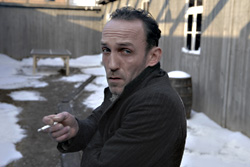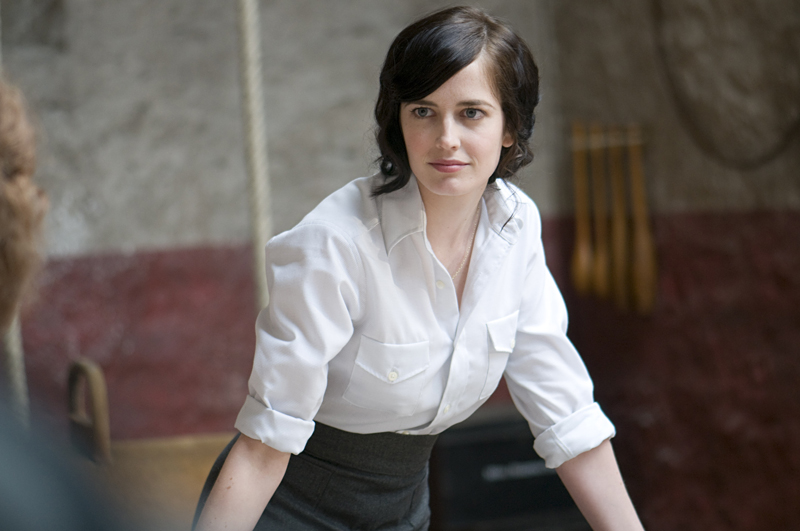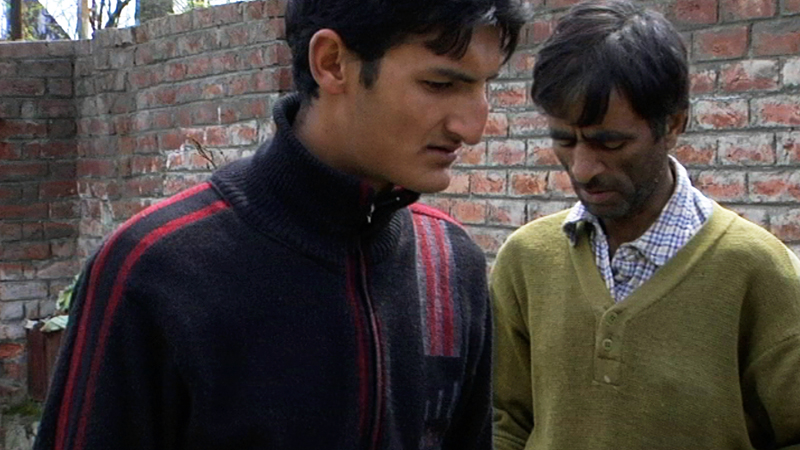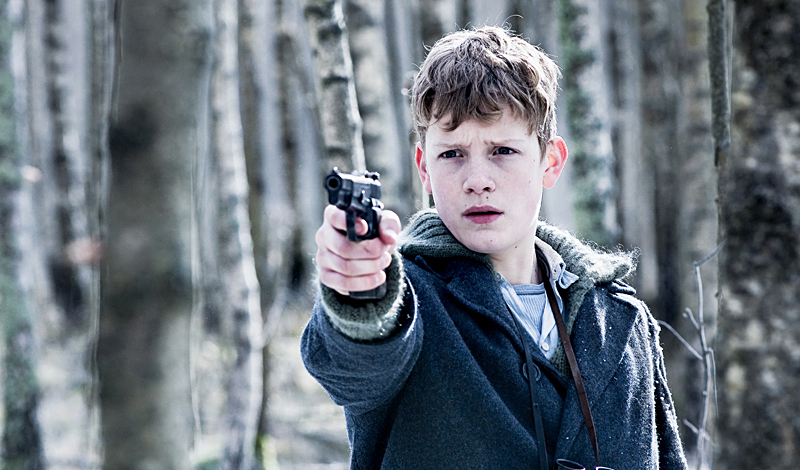Near the beginning of The Counterfeiters, a fact-based Holocaust drama by Austrian filmmaker Stefan Ruzowitzky, we meet Jewish money forger and former jailbird Salomon Sorowitsch (brilliantly played by Karl Markovics), packing to flee Berlin in 1936 with a suitcase full of fake money. We know from an opening coda that Sorowitsch will survive the war, but for now his cockiness doesn’t save him from arrest by an old nemesis, counterfeit inspector Friedrich Herzog (Devid Striesow). Herzog, himself a smooth operator who’s ravenous for career advancement, soon resurfaces as a camp commandant, rescuing Sorowitsch from Mauthausen, where he’s made himself useful painting flattering portraits of SS functionaries, and bringing him to the Sachsenhausen camp in Germany. There, sequestered in a relatively cushy laboratory with a select team of similarly skilled inmates brought in from other camps, Sorowitsch will oversee the mass production of fake dollars and pounds sterling, with which the Germans plan to flood the British and American economies and so bring them to ruin.
Sorowitsch is no hero, and when an Austrian filmmaker who makes no secret of the fact that his grandparents were Nazi sympathizers takes as his subject a Jewish shyster who survived the Holocaust by giving his captors what they wanted, is he a brave boy or a rotten apple falling unpleasantly close to his nation’s tarnished tree?
Ruzowitzky is hardly the first director, Jewish or otherwise, to pry Holocaust cinema loose from its reverential focus on saintly Jewish victims trodden down by goose-stepping aggressors. From Schindler’s List on through The Pianist, Downfall, and Black Book, not to mention a host of documentaries, filmmakers on both sides of the Atlantic have moved to take the hero/villain equation out of the 20th century’s worst nightmare. Ruzowitzky lives and works in a country known more for self-pity and prevarication than for remorseful introspection about its role in propping up the Third Reich.
The Counterfeiters is based on a memoir by Adolf Burger (played in the movie by August Diehl), the lab’s Communist idealist, who makes no bones about his disgust for Sorowitsch’s collusion with the equally crooked Herzog and advocates sabotaging the Nazi money-printing scheme. The movie plays like a sepia-toned realist drama whose purpose is to spring Sorowitsch from stereotype and expose him as a flawed, even damaged man torn between his Darwinian credo (adapt) and a fatherly desire to protect the weak. But The Counterfeiters is also peopled with types—the socialist rebel, the bourgeois Prussian banker striving to replicate his past status, the kindly kapo doctor trying to save lives even as he placates his masters, the sadistic Nazi underling who arbitrarily shoots to kill while his “enlightened” superior doles out favors.
Shifty-eyed, hatchet-faced, and with an eye for comely German shiksas, Sorowitsch himself sails a touch too close for comfort to Nazi cartoons of the sex-obsessed criminal Yid. But Ruzowitzky means to humanize him, not make him likable, just as he means to show that Burger’s impetuous rebellion places his comrades in danger for the sake of a principle that may or may not be worth upholding under such duress. What physical brutality there is in the movie is kept peripheral, in part to underscore the dreadful predicament of the lab workers (what must it have been like to live in such relative luxury while, all around them, inmates suffered and died under appalling conditions?), but also to muddy the waters for moviegoers accustomed to getting their Shoah stories in black and white.
At its best—and queasiest—The Counterfeiters asks disturbing questions more commonly found in the survivor literature of Primo Levi or Bruno Bettelheim than at the movies. Ruzowitzky quietly asks what counts as moral behavior under fascism, and whether or not one’s first duty is to survive. Such questioning plagued Levi all his life, and it may take Germany and Austria down a rocky path: I recently read an op-ed by a German woman who suggested that her countrymen might want to look for more “positive” World War II role models than the leaders of the White Rose student resistance movement, who, like Burger, endangered the lives of their colleagues and ended up literally losing their heads.
In the end, The Counterfeiters caves to a heroic story of sorts, implying that appeasing the enemy only depletes the spirit, and dreaming up a penitent act for Sorowitsch that’s unsupported by the evidence. But Ruzowitzky complicates the battle between pragmatism and idealism by facing up to the fact that the Nazi machine rode roughshod over the brave and the feckless alike, that survival in the camps was largely a matter of luck and stamina, and those who had it were left with crippling survivor’s guilt. For all his literary acclaim, Levi battled repeated depressions and is thought to have ended his own life, while Sally Sorowitsch reportedly thrived as an art forger in Argentina.








